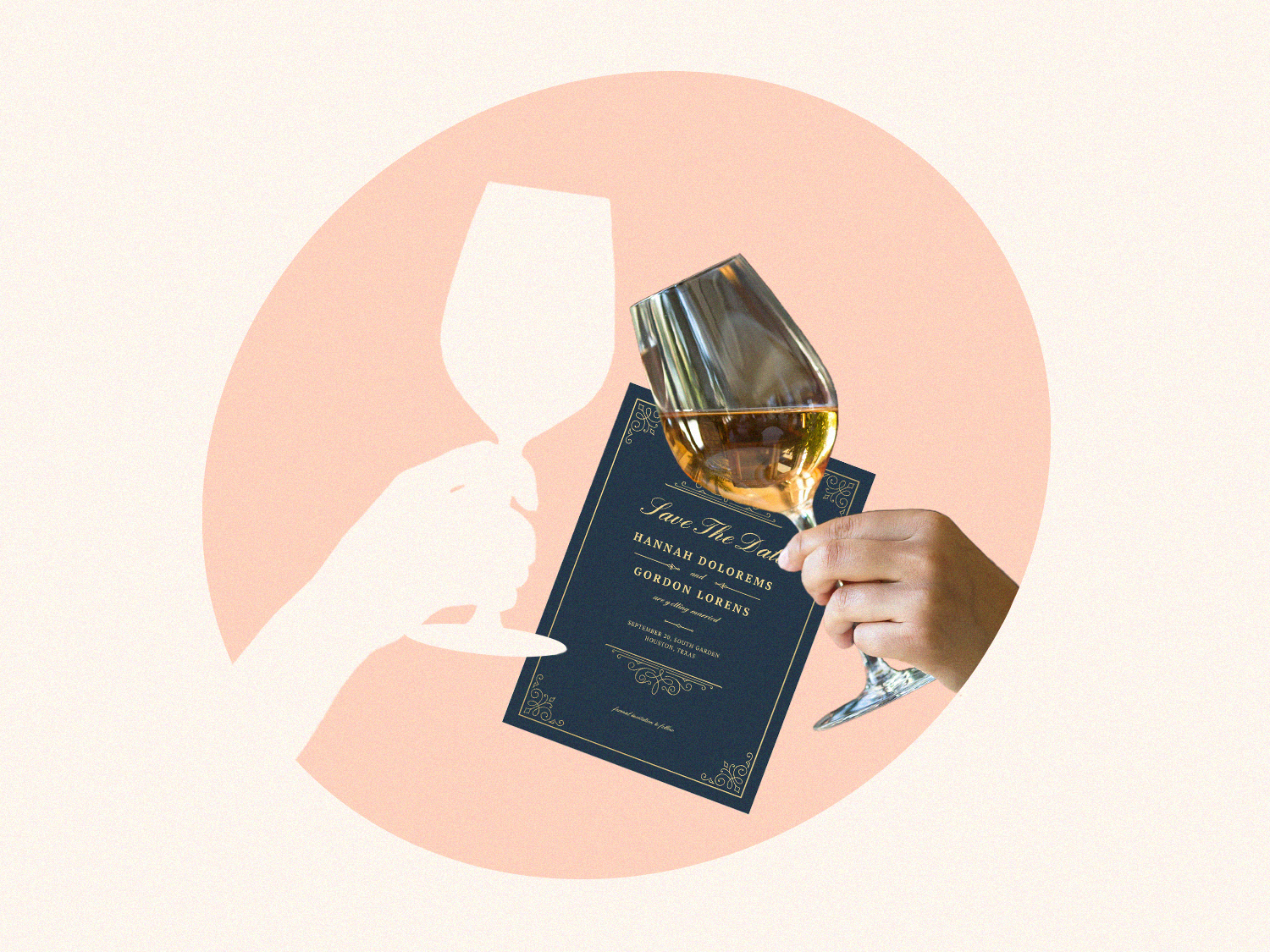How to Handle Wedding Stress Based on Your Enneagram Type
Stressful moments are bound to crop up throughout the wedding planning process, but how much you enjoy your journey to that altar is directly dependent on how you deal with these stressors. Even if you've never considered yourself someone adept at "rolling with the punches," there's no better time to start—you just need to know your strengths and weaknesses first.
Enter: Your Enneagram. Beloved by the self-improvement community, this one little number can actually be the key to bettering your ability to handle wedding planning stress and arming yourself with a toolkit for when things (inevitably) go awry.
What is the Enneagram?
The Enneagram is a personality assessment tool used to help you discover more about the critical motivators behind your actions. Each of the nine possible results describes a different personality type, but all of the types are interconnected. While it looks complicated on paper, the Enneagram is ultimately a great tool for confronting your shadow self and recognizing your growth areas (even that sounds intimidating but we promise it's not!).
If you're curious about your Enneagram type, you have several accessible options for finding it out, including online assessments. However, many Enneagram coaches will encourage you to read about each type and conclude based on personal introspection.
Wedding Planning by Enneagram Type
Enneagram Type One: The Reformer
Their greatest motivator: To be "good" or righteous. Type Ones want to be seen as principled, self-controlled and perfectionistic. The Type One to-be-wed is likely to be rational and direct, and hold their vendors (and themselves) to high standards. They believe they can achieve "the perfect wedding" and will refuse to take shortcuts in getting there.
Their greatest area for growth: When a Type One experiences growth, they tend to loosen up and lean into their light-heartedness. They begin to let go of the reins and refocus on what's truly most important—which, in this case, would be marrying the love of their life.
How to approach wedding planning: If you're a Type One, you may have a blindspot related to trust and tempering your expectations. Throughout the wedding planning process, it will be helpful to remember that while you can't control or influence those around you all the time, you can hire a team that you trust and allow them to show up for you. you find yourself becoming a bit rigid or harsh with your communication style during the planning process, gift yourself a day at the spa or carefree time with loved ones. Type Ones tend to be hyper-focused on smaller details and forget to pour back into themselves. Remember that this is your season of bliss. Be intentional with spending time with your partner and let go of the small things that won't matter after 'I do.'
Enneagram Type Two: The Helper
Their greatest motivator: To be loved, accepted and needed. Those that identify as an Enneagram Type Two want to be seen as caring, generous and loving. When planning their wedding,Type Twos are likely gentle, mild-mannered and perhaps a bit of a people pleaser—even when it comes to their wedding. They have trouble asking for help, often because they are so busy helping others.
Their greatest area for growth: When a Type Two experiences growth, they can bring the focus back on them as an individual and make decisions based on personal taste. They're able to lean into what makes them unique and give themselves the space to celebrate it! Healthy Type Twos can find the balance between 'give and take."
How to approach wedding planning: Type Twos can lose sight of their desires and are the most likely to plan a wedding around their guests' needs instead of their own. If you are a Type Two, it will be important to identify and honor the vision you have for the wedding. Yes, compromise comes with the process, but you want to be able to look back and see your special touch on the day. After all, Type Twos are prone to harboring resentment if they feel that no one around them is considering their needs. It will be necessary for a Type Two to let go of their pride and allow their inner circle to help with the wedding planning process. Assign smaller tasks to the wedding party and trust that people want to show up for you.
Enneagram Type Three: The Achiever
Their greatest motivator: Type Threes want to be seen as charming, worthy and the person everyone wants to be. The Type Three bride or groom is likely someone adept at working the room. They tend to be diplomatic and polished but have a habit of becoming overly concerned with their appearance or reputation. Most likely, Enneagram Threes aren't just trying to plan "a wedding"— they're trying to plan the wedding of the year.
Their greatest area for growth: When a Type Three is healthy or experiences growth, they tend to be confident in who they truly are and can remain loyal to the people around them. They can make decisions based on what they want, not what is going to get the most likes on Instagram.
How to approach wedding planning: Interestingly enough, when a Type Three is stressed, they are less likely to turn into a bridezilla (or groomzilla) and more likely to withdraw and make plans for an elopement. It will be important for a Type Three to stay in touch with themselves both mentally and emotionally throughout the process. And, because a Type Three will want to do it all, outsourcing tasks to friends, family and vendors will be crucial to enjoying the engagement season.
Enneagram Type Four: The Individual
Their greatest motivator: Enneagram Type Fours want to be seen as unique, deep and individualistic. The Type Four to-be-wed likely has the wedding theme no one else has thought of or is breaking tradition in some way. Type Fours tend to be introspective and romantic but have a habit of staying in a melancholy space or only making decisions with their heart. A Type Four could potentially find themselves compromising their established budget in the name of "staying authentic" or find themselves feeling misunderstood during the process.
Their greatest area for growth: When a Type Four evolves and matures, they tend to be more organized and proactive in finding solutions to their problems. They are able to bring their dreams to fruition and appreciate their hard work by being in the moment.
How to approach wedding planning: When a Type Four is stressed, they will become codependent and overly involved with the process. A Type Four can help themselves by outlining important due dates, goals and outcomes for each step of the wedding process. Their partner can help keep them accountable and ground them in the moments they're inspired to change something on the fly.
Enneagram Type Five: The Investigator
Their greatest motivator: A Type Five is happiest when they're seen as capable, intelligent and knowledgeable. While some brides are busy adding to their Pinterest boards or scheduling cake tastings, the Type Five is most likely immersing themselves in learning about the history of weddings. Type Fives can also stall or come down with a bad case of cynicism during the wedding planning process.
Their greatest area for growth: When a Type Five is healthy, they tend to be action-focused and decisive. They can apply their knowledge and data and see their plans come to life in an orderly—but not consumed—fashion.
How to approach wedding planning: It's important for Type Fives to remain optimistic, motivated and open-minded during the wedding planning process. Type Fives can lean into their childlike wonder and explore new ideas for the wedding or think about ways to make the day all the more meaningful. Rest will be another important aspect to Type Fives—they're notorious for their low energy at times, so a self-care routine will allow for a blissful season.
Enneagram Type Six: The Loyalist
Their greatest motivator: A Type Six wants to feel secure and supported in life. They are most likely to have a wedding party filled with lifelong friends and every speech will highlight their loyalty, dependability and kindness.
Their greatest area for growth: Though every type is prone to anxiety and depression, a Type Six can experience a heightened sense of anxiety. However, once a Type Six feels secure, they resemble someone much more motivated, confident and accomplished. They can stop overthinking and start doing.
How to approach wedding planning: If you're a Type Six, you may have a blindspot as it relates to trust and optimism. And—for what it's worth—you may be more than justified to feel like those in your life can't rise to the occasion when wedding planning. It will be crucial to remember that while you can't control others, you do have agency over yourself.
It's a waste of time to ask a Type Six not to have a backup plan (What if it rains? What if the officiant doesn't show up?), but there needs to be a self-care plan in addition to the backup plan. A Type Six should think about how they can show up for themselves during this season of life, identify what they can control and focus their energy there.
Enneagram Type Seven: The Enthusiast
Their greatest motivator: Enneagram Type Sevens want to be happy, energetic and experience all that life has to offer. The Type Seven bride or groom-to-be are probably throwing the party of a lifetime—not because that's what they're aiming for, but because it's bound to happen. (Anything can happen with a Type Seven.) They tend to be optimistic and exciting but just as equally undisciplined and scattered. They're likely to be the person who has amazing ideas for the weddings but forget to call the vendor to make it happen.
Their greatest area for growth: Type Sevens are wildly exciting and truly some of the most loving people you'll meet. When they can temper their impulsive behavior with moments of calm rationale, steadiness and curiosity, they can reach their full potential.
How to approach wedding planning: To maximize and enjoy the wedding planning season, a Type Seven should lean into their ability to stay positive and see the glass half-full. They are gifted at reframing perceived hiccups as pivots and new adventures. However, when they are stressed, it's easy for a Type Seven to become perfectionist. Therefore, delegating tasks and remaining in a headspace of optimism will be key for the Type Seven. (And leave room for surprises—they never disappoint a Seven.)
Enneagram Type Eight: The Challenger
Their greatest motivator: The Type Eight wants to control and protect the things and people they care about. Type Eights can be misunderstood at times, often becoming known for their direct nature. In actuality, Type Eights are caring, focused and decisive. Will they let a vendor know if they've messed up? Yes. But will the Type Eight also stop at nothing to give their partner the best day of their life? Absolutely.
Their greatest area for growth: The wedding planning process comes with so many emotions, and sometimes things don't go as planned. Where a Type Eight might become naturally domineering and agitated, they can work to extend grace to others and realize it's OK not to control every last aspect of the wedding.
How to approach wedding planning: If a Type Eight bride or groom has the resources to hire a wedding planner, they could be investing in much more than a coordinating genius. A wedding planner can act as a shield between a Type Eight and vendors or wedding day mishaps.
But if you're a Type Eight planning the wedding solo, consider keeping a list of top priorities. In a dream world, we wouldn't have to sacrifice anything and the day would be perfect. But in reality, we have to "live and let live" in some areas. By writing out their top priorities, a Type Eight might realize that beyond the music, flower choice and open bar, they don't need to have 100 percent control, allowing them to focus on the most meaningful aspects of the wedding.
Enneagram Type Nine: The Peacemaker
Their greatest motivator: Type Nines want harmony, peace and for everyone to feel seen and heard. They tend to be supportive, calming and someone who shies away from the spotlight. Most likely, Nines aren't trying to plan a wedding around them; they're planning it around those they love most.
Their greatest area for growth: When a Type Nine is healthy and mature, they are more ambitious, focused and level-headed. They can look internally and identify their needs. Ultimately, a Type Nine should attempt to move toward autonomy and independence as they continue to evolve as people.
How to approach wedding planning: When a Type Nine is wedding planning, they can resemble a Type Two, worried about what others want instead of focusing on their own needs. When wedding planning, it's nearly inevitable that you'll receive unsolicited advice, and a Type Nine needs to feel empowered to say no with confidence. If they can communicate their needs and vision to their wedding planner, future spouse and loved ones, they are more likely to enjoy the wedding of their dreams.
























